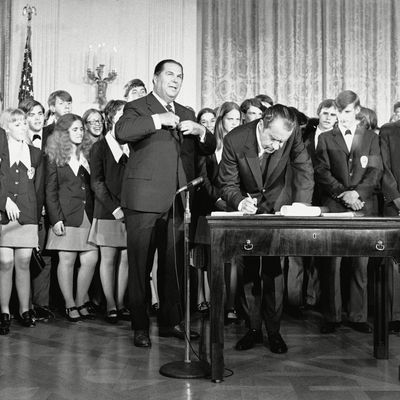
When the 26th Amendment to the Constitution was ratified nearly 49 years ago, extending the vote to 18-year-olds, it was a landmark accomplishment for the baby-boom generation. Now, as boomers steadily reach their golden years, the same amendment may serve to eliminate election laws discriminating in their favor.
As I noted in one of my recent stories on voting by mail, a big issue during the coronavirus pandemic is that seniors (who, as a group, lean Republican) benefit from special exemptions in states that otherwise tightly restrict absentee balloting — exemptions Donald Trump has supported despite his general antipathy toward voting by mail:
The seven states that generally discourage voting by mail but waive excuse requirements for Republican–leaning old folks are Indiana, Kentucky, Louisiana, Mississippi, South Carolina, Tennessee, and Texas. Coincidentally or not, these are all deep-red states carried by Trump in 2016, most of them by large margins (Texas, which went MAGA by nine points, was the closest). They appear to provide Trump’s model for the country as a whole.
As Mark Joseph Stern reports, there’s now an effort underway to challenge such laws as violating the 26th Amendment:
On Wednesday, voting rights advocates filed a federal lawsuit against Texas’ restriction. It is likely the first in a spate of challenges to protect the election. Unless the federal judiciary decides to unilaterally rewrite the 26th Amendment, it will be obligated to invalidate these laws.
Although it is often viewed as a simple promise that Americans can vote upon turning 18, the 26th Amendment is actually a broad ban on age-based voting restrictions. It declares that the right to vote “shall not be denied or abridged” for citizens 18 and over “on account of age.” In other words, the amendment does not just protect 18-year-olds’ ability to vote. It also forbids any law that abridges adult citizens’ right to vote because of their age.
As Stern observes, there’s significant judicial precedent for an interpretation of the 26th Amendment as a broad ban on age-based discrimination in voting procedures. And oddly enough, some Republicans could join the parade after looking at recent polls showing Joe Biden pretty consistently leading Donald Trump among over-65 voters. The most pro-Republican age demographic at present seems to be those approaching but not yet arriving at retirement age. Why not give them access to mail ballots as well?
It’s unlikely seniors themselves care about keeping this privilege to themselves. After all, many of them benefited from the extension of voting rights back in 1971.






























